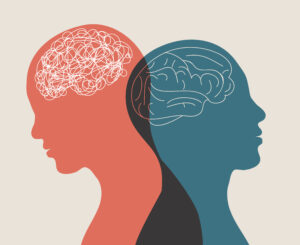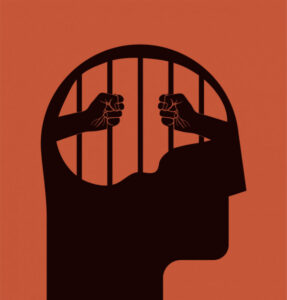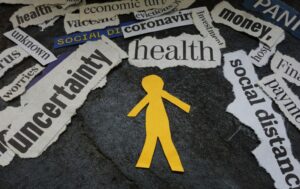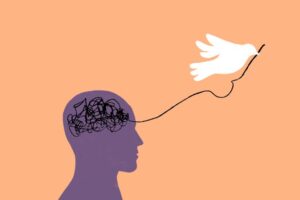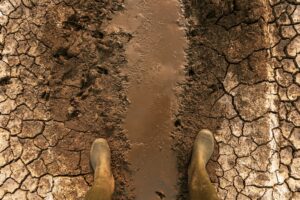Seasonal depression isn’t just a winter phenomenon.
Many have experienced a mood dip brought on by a frigid winter or a rainy weekend. But extreme heat can also have a significant impact on mental health.
As the U.S. swelters under an unrelenting heat wave, experts say the sky-high temperatures could make people more frustrated and stressed and exacerbate existing mental health conditions.
“I can estimate what the temperature is outside without even stepping outside my office,” said Susan Albers-Bowling, a clinical psychologist at the Cleveland Clinic. “This week, in particular, when it is excessively hot, I see an increase in frustration, irritation, anger, listlessness.”
The National Weather Service warned that this week would bring dangerous levels of heat to cities in the East as heat advisories, watches or warnings were issued for more than 100 million people.
Philadelphia’s Health Department declared its first heat health emergency of the year through this Saturday. Temperatures could climb to the 100s in Pittsburgh and could reach 101 degrees in Washington, D.C., this weekend. Boston could see its second 98-degree day on Thursday. In Caribou, Maine, a 103-degree heat index set an all-time record, even as forecasters predicted temperatures could rise another 2 degrees.
Temperatures in Worcester, Massachusetts, and Providence, Rhode Island, broke century-old records on Wednesday. And the heat index in northwest Ohio and northern Indiana could hit 102 degrees on Friday, while farther west, Phoenix and Tucson could see temperatures climb to 113 degrees.
Extreme heat can cause irritation, anxiety, raise stress hormones
Warm weather improves mental health – people get outside and soak up more Vitamin D when it’s nice outside, Albers-Bowling said. But extreme heat can have the opposite effect.
“Heat has been shown to cause irritability, agitation, anxiety, cognitive impairment,” she said. “Research also shows that, during heat waves, there’s a noted increase in suicide rate, domestic violence, substance use and crime.”
Albers-Bowling said the high temperatures could take various forms, including through disruption to sleep. “If you aren’t sleeping well, it’s likely you’re going to be much more irritable and frustrated the next day, or feeling depressed or blue,” she said.
Get the Daily Briefing newsletter in your inbox.
The day’s top stories, from sports to movies to politics to world events.
Delivery: DailyYour Email
Extreme heat can also cause hormone changes, including an increase in cortisol, the stress hormone, and can reduce alertness and cognition, she said. “People have noticed changes in their work habits, they may notice that they’re dragging at work or they have trouble getting started or motivated with different projects.”
Elevated temperatures can even lessen the effectiveness of certain medications, she said.
ER visits for mental health increase during heat waves
Statistics show the dangerous physical effects of extreme heat on the body. Heat-related deaths rose from 1,722 in 2022 to more than 2,300 in 2023, according to the Centers for Disease Control and Prevention. Last summer, rates of emergency room visits for heat-related illness jumped “substantially,” the agency reported.
Emergency room visits for mental health-related concerns also increased as temperatures got hotter, according to research by Amruta Nori-Sarma, an assistant professor at Boston University School of Public Health’s Environmental Health Department. Nori-Sarma said she found that between 2010 and 2019, the rate of emergency department visits with “mental health outcomes” increased by 6-11% on the five or six hottest days of the year.
Nori-Sarma said the visits were linked with a wide range of mental health disorders, including mood disorders, anxiety and stress disorders, self-harm, schizophrenia and substance use disorders. “What I think that means is that extreme heat is this external stressor that’s really exacerbating people’s underlying mental health symptoms,” she said.
Albers-Bowling said some groups are more vulnerable to the psychological impacts of heat than others, including young children, the elderly, people with pre-existing mental health issues like anxiety or depression, and those who suffer from chronic illnesses.
Socio-economic conditions can also make a difference – people who don’t have air conditioning or work outside all day are at greater risk, Albers-Bowling said. Nori-Sarma also noted that her research focused on people with commercial health insurance, but the mental health impacts of extreme heat on people with public insurance or who aren’t insured remain understudied.
Experts say increasing temperatures brought on by climate change could have a lasting impact on mental health. Global heat is already smashing one record after another – last year was the hottest on record, and last summer hit the highest temperatures in 2,000 years, according to a Nature study. And the end of May marked 12 straight months of record-high temperatures, the second-longest recorded streak of heat.
Nori-Sarma said existing mental health services already don’t meet public need. Rising temperatures could exacerbate that demand. “It’s very reasonable to assume that some health systems may be overwhelmed in (the) future,” she said. “It’s really important to start preparing now for when we see a heat wave is going to be happening.”
Albers-Bowling urged people to prepare for the potential psychological effects of an oncoming heat wave by drinking water and cooling down periodically.
“Being hydrated is something that everybody could do to help boost their mental health,” she said. “Also, staying cool, wearing cool clothing, staying in air conditioning, staying inside during the hottest part of the day.” A cold shower or placing a cool washcloth on the forehead can also restore concentration and attention, she said.
The heat also makes it harder for people to take a stroll outside, which many use to alleviate stress. “Finding alternatives for stress management and relaxation can be key,” she said.
Albers-Bowling said personal check-ins and staying in touch with physical and mental well-being can go a long way. “Just having that awareness can make people put a label on why they may be feeling more depressed, anxious, irritable,” she said.
Author:: Bagombeka Job
CREDIT:: USA TODAY












